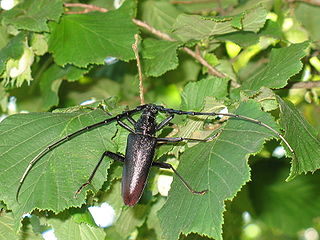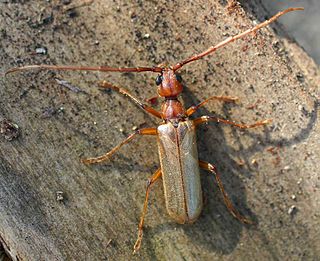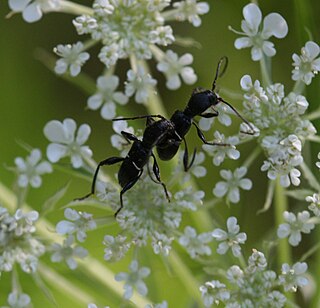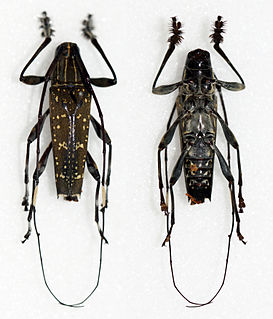Moron or Morón may refer to:

The longhorn beetles (Cerambycidae), also known as long-horned or longicorns, are a large family of beetles, with over 35,000 species described. Most species are characterized by extremely long antennae, which are often as long as or longer than the beetle's body. In various members of the family, however, the antennae are quite short and such species can be difficult to distinguish from related beetle families such as the Chrysomelidae. The scientific name of this beetle family goes back to a figure from Greek mythology: after an argument with nymphs, the shepherd Cerambus was transformed into a large beetle with horns.

Giovanni Antonio Scopoli was an Austrian physician and naturalist. His biographer Otto Guglia named him the "first anational European" and the "Linnaeus of the Austrian Empire".

Lamiinae, commonly called flat-faced longhorns, are a subfamily of the longhorn beetle family (Cerambycidae). The subfamily includes over 750 genera, rivaled in diversity within the family only by the subfamily Cerambycinae.

Macrodontia is an American genus of long-horned beetles remarkable for their large size and for the large mandibles of the males in particular.

Cerambyx is a genus of beetles in the family Cerambycidae. They are commonly known as capricorn beetles, as their strong, stout and curved antennae, each segment of which flares towards the tip, are reminiscent of the horns of an Alpine Ibex or "capricorn".

The Disteniidae are a small family of beetles in the superfamily Chrysomeloidea, traditionally treated as a group within the Cerambycidae.

The Oxypeltidae are a small family belonging to the superfamily Chrysomeloidea, widespread in the Andean region of Chile and Argentina. They have traditionally been considered a group within the Cerambycidae.

The Vesperidae are a small family of beetles, normally classified within the family Cerambycidae, of heterogeneous aspect but all characterised by larval stages related to roots of herbaceous plants or trees

Euderces is a genus of longhorn beetles, family Cerambycidae. They are found in South, Central, and North America, with the centre of diversity in southern Mexico and Guatemala.

Callidium is a genus of beetles in the family Cerambycidae, containing the following species:
Trachyderini is a tribe of long-horned beetles in the family Cerambycidae. There are at least 140 genera and 650 described species in Trachyderini.
Lepturgantes is a genus of beetles in the family Cerambycidae, containing the following species:

Aegomorphus is a large genus of beetles in the family Cerambycidae.
Anoplophora is a genus of beetles in the longhorn beetle family (Cerambycidae). They are native to Asia. Most are large and colorful and thus are depicted in artwork and sought after by beetle collectors. The genus also includes several notorious pest insects.
Syllitus is a genus of long-horned beetles in the family Cerambycidae. There are more than 40 described species in Syllitus.
Tapeina is a genus of Neotropical longhorn beetles in the subfamily Lamiinae. It is the only genus in the tribe Tapeinini.

Colobothea is a genus of longhorn beetles of the subfamily Lamiinae.
Podabrocephalus is the only genus in the beetle family Podabrocephalidae, or alternatively, included in the highly diverse family Cerambycidae. Its only species is Podabrocephalus sinuaticollis. It is known from southern India.











